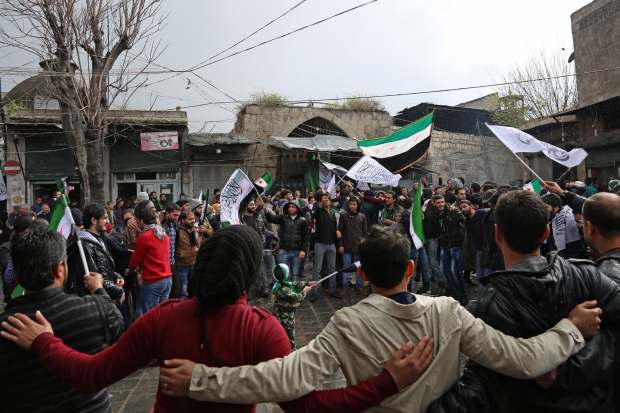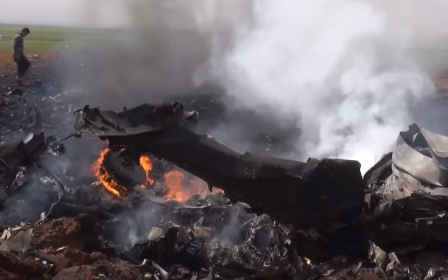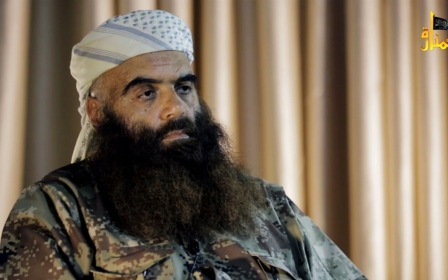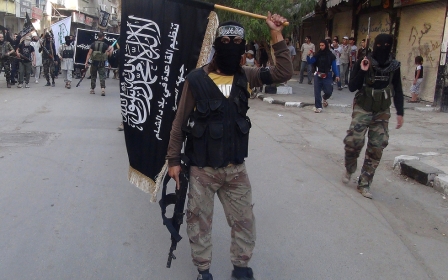Nusra tightens grip in Syria's Aleppo, despite civilian opposition
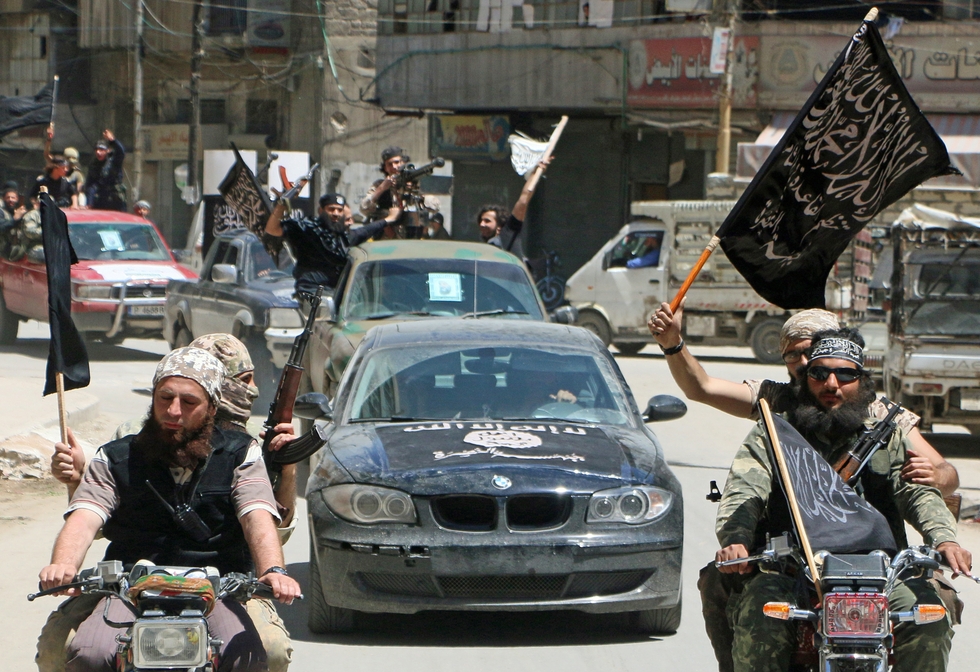
Aleppo, Syria - The black flags of the Nusra Front were held high as supporters paraded down the streets of the rebel-controlled eastern part of this city.
Traffic ground to a halt as crowds gathered to fire Kalashnikovs in the air and chant for al-Qaeda's affiliate: "We are the soldiers of God... democracy is for infidels."
Since the start of the year, such marches have become an almost weekly event in Aleppo, a city that has become a flashpoint of Syria's war - attacked from the air by Russia, pressed on the ground by Syrian government forces.
An internationally agreed ceasefire between "moderate" rebels and Syrian government forces does not include Nusra, placing pressure on their fighters to withdraw from civilian areas as they face continued bombardment.
In neighbouring Idlib, the group's stronghold, pro-democracy protesters clashed with Nusra supporters last month.
But in Aleppo, Nusra appears unmoved by counter-marches by moderates and an apparent growing opposition among residents to its presence.
The signs are that Nusra is in Aleppo, and it is staying in Aleppo.
Mustapha al-Maghrebi, who sells clothes in the east of the city, told Middle East Eye: “The protests target those who oppose them.
"They call for the establishment of a caliphate and sharia law instead of 'infidel' rule," he added - a reference to moderates currently running rebel-held areas.
“They have no other goal but to remind the public and the Free Syrian Army that Nusra is present, strong and not going anywhere.”
Arif al-Ahmed, an English teacher, added: “Of course. Who lives in Aleppo and hasn’t seen Nusra protests in the streets? They’re targeting areas without much religious education. God will punish them for this."
Nusra entered the Syrian war in 2011 and by 2012 had emerged as one of the most formidable military groups in Aleppo.
Relations between Nusra and other rebel groups in Aleppo have been hot and cold ever since. In 2012, some FSA commanders in Aleppo praised the group as valuable in their war against President Bashar al-Assad. However, others criticised Nusra’s ideology.
But for some fighting for the FSA, the feeling is different.
Ahmad Jalal, an FSA commander, estimates up to a third of residents support the group, and suggests an alliance remains with Nusra despite their bogeyman status in the ceasefire.
“Syrians have many friends in the battle on the frontlines," he said. "We differ from [Nusra] in many respects, but they are not our enemies in the literal sense as long as they do not fight us. They aren’t enemies and they aren’t friends at this time."
Abd ar-Rahman Sheikh, a captain in the FSA-allied Jaish al-Islam, a Salafist group, takes it a step further.
Sheikh, stationed in Aleppo, does not view Nusra as an enemy and believes its fighters are an important force in the city - their prowess on the battlefield is not to be rejected.
“In my opinion, we have no problems. They are strong fighters on the front,” he said.
While neither Jalal nor Sheikh are spokesmen for their respective groups, their statements indicate that at least some rebel commanders believe al-Qaeda's affiliate will be needed in battles to come.
And Nusra has been active during the ceasefire.
Earlier this week, its fighters drove Syrian government forces from the Allepan village of el-Eis, suggesting a willingness to not only maintain but also to expand Nusra's influence in the province.
The uneasy peace with other rebel groups has however not always held, and further power grabs could force the issue.
The FSA clashed earlier this year in Idlib province with Nusra.
A report by IHS Conflict Monitor, which tracks the conflict in Syria, states there has been a "substantial increase" in fighting between Sunni groups that support the ceasefire against rival Sunni factions that do not support the ceasefire, or have been excluded from it.
Fighting in Idlib between Nusra and its ally Jund al-Aqsa on the one side, and Kurdish forces and the FSA on the other "increased four to five times in the first two weeks of the ceasefire".
The possibility looms of similar clashes in Aleppo.
Khaldoun Dibluni, a mobile phone seller in rebel-controlled eastern Aleppo, sees everything that happens - bombings, strafing runs by government planes, and an increase in protests. "Each week protests occur by people raising the green banners of the revolution, or the black banners of Nusra Front," he said.
For some Aleppans, there is reason to believe Nusra’s presence will bring more war to the city, despite the ceasefire.
"Of course I worry," said Maghrebi, the clothes merchant. "The international powers carry out bombings in regions where Nusra are. This has happened recently since the ceasefire."
Whether he will witness all-out fighting involving Nusra remains to be seen.
New MEE newsletter: Jerusalem Dispatch
Sign up to get the latest insights and analysis on Israel-Palestine, alongside Turkey Unpacked and other MEE newsletters
Middle East Eye delivers independent and unrivalled coverage and analysis of the Middle East, North Africa and beyond. To learn more about republishing this content and the associated fees, please fill out this form. More about MEE can be found here.


